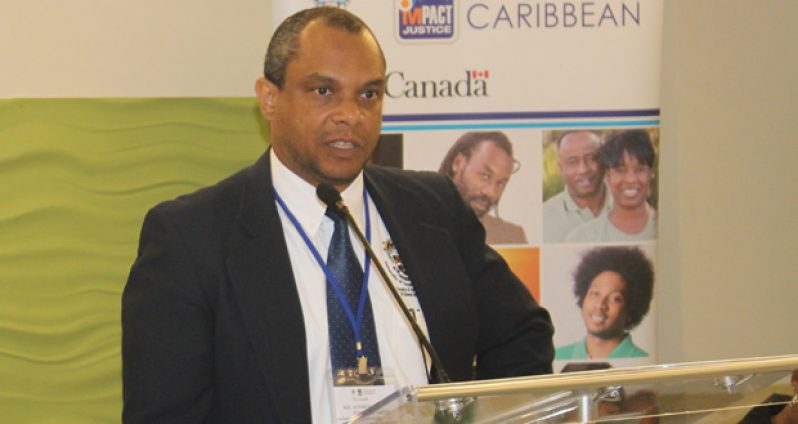By Ravin Singh in Barbados
MANAGING Director of MEDIAROBERS and regional journalist, Julian Rogers, on Tuesday opined that one of the pillars of Journalism is that it should be free from political interference and be geared towards keeping the public informed.

Rogers, who hails from Antigua and Barbuda, was one of the four presenters who addressed 68 media workers and law students on Tuesday at the Improved Access to Justice in the Caribbean (IMPACT) Justice Media Law workshop, currently being held in Barbados. According to Rogers, whose presentation focused primarily on ‘educating the public about its rights’, the media has a responsibility to keep the public informed, though it is acknowledged that this is not achieved without challenges.
“We have a responsibility to keep the public informed,” he said, adding, “how we do that is up to us, and it is a challenge.” But while this is an unavoidable challenge which media practitioners must face, he noted, at the same time, Journalism should be free from political interference.
Seasoned in journalism, the MEDIAROBERS Director reflected on the colourful history of Guyana, referring to the fact that the media did not have the liberty in the post-colonial era to function independently, given that it was state-owned. In a regional context, he explained, the environment was one wherein there was great challenge in terms of ideology.
And noting that Journalism is a “business [which] started in tough times,” Rogers acknowledged that many practitioners, in historic times, sacrificed their time, efforts and resources for the advancement and development of the media fraternity. “Modern media practitioners owe them the credit,” he said.
Weighing in on the role of journalists, Rogers supported the journalistic principle that the least important opinion is that of the journalist. However, he noted that the editor is the only person who is afforded the opportunity to take a position on an issue. “The position of the editor stands out from the position of people from other spheres of society,” he told the attendees.
But when these positions are adopted, Rogers explained, they are usually complemented with “editorial challenges” which include, but are certainly not limited to, threats to journalists and withdrawals of ads from the media outfit.
Supporting Rogers’s contention in a subsequent presentation was Lecturer at the University of Technology, Jamaica, Andrew Smith, who, speaking in a balanced tone, highlighted that journalists have a responsibility to seek out the truth in the interest of the public, since it is the public’s rights to know.
But beyond that, he said, journalists both directly and indirectly carry several other responsibilities, including judgement — not to publish something that they are uncertain of; not suppressing information; not using dishonest methods to obtain information, recordings, images, or documents; not manipulating this data or have them manipulated by a third party with a view to their falsification; and not plagiarizing.
Additionally, Smith noted that journalists are to rectify any published information that is revealed to be factually incorrect; respect professional secrecy; not reveal the sources of any information obtained in confidence; and respect peoples’ privacy insofar as the public interest does not demand otherwise.
Turning his attention briefly to freedom of information, which should be allowed in all jurisdictions in the Caribbean, he explained that this contributes to government openness and is an important instrument used to prevent and combat corruption. Additionally, it is used as a tool to address poor governance through informed debates, he said.
Not limiting his presentation to responsibilities of journalists and freedom of information, the university lecturer told media practitioners that the most basic right of anyone is freedom of expression, which is enshrined in Article 19 of the United Nations (UN) Declaration of Human Rights.
Article 19 of the UN Declaration of Human Rights reads: “Everyone has the right to freedom of opinion and expression; this right includes freedom to hold opinions without interference and to seek, receive and impart information and ideas through any media and regardless of frontiers.” And while journalists have a duty to permit freedom of expression of all parties included in a news story, Smith was keen to note that “we’re journalists, not public relations (PR) officers.”












